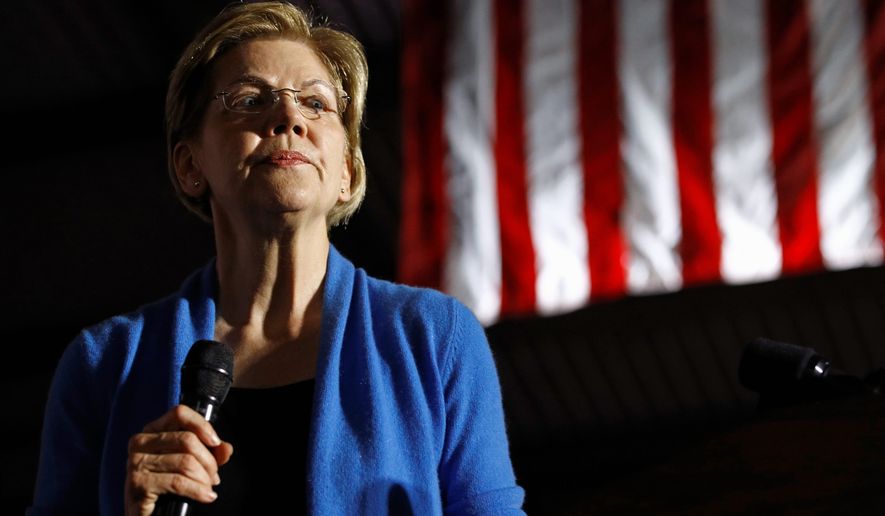When tracking the reasons Sen. Elizabeth Warren’s presidential bid fell short, don’t forget the conservative law professor in Ithaca, New York, who wouldn’t let the world forget that the Massachusetts Democrat for years had identified herself as an American Indian.
Cornell Law School professor William A. Jacobson created and maintained the Elizabeth Warren Wiki for seven years. The site documents the controversies that have dogged her political career, starting with her disputed claims of Cherokee ancestry.
“Americans will vote for many different types of characters, but the one thing that I think is devastating is when someone is viewed as inauthentic, as a faker,” said Mr. Jacobson. “She was never able to shake that, and that all originated with the Native American problem.”
During her bid for the Democratic presidential nomination, which ended Thursday after her poor showing on Super Tuesday, she was repeatedly challenged on her characterizations of her previous professional work and episodes from her past.
They included her legal representation of large corporations; losing her teaching job in 1971 over being pregnant; describing her father as a janitor; accusing a senior professor of sexual harassment, and being the first nursing mother to take the New Jersey bar exam.
All those incidents and more were chronicled on EWW, which isn’t affiliated with Wikipedia, often after appearing in Legal Insurrection, the conservative blog founded by Mr. Jacobson in 2008. Both served as resources for news outlets seeking information on all things Warren during the Democratic primary.
He isn’t politically neutral, but he said he has gone out of his way to keep EWW, available at ElizabethWarrenWiki.org, “straight, nonargumentative, everything sourced, hundreds of footnotes,” using the research of others, including Cherokee genealogists, whenever possible. The site has been viewed more than 750,000 times.
“It’s a somewhat unique role,” Mr. Jacobson said. “I can’t think of any other candidate where you’ve got one person documenting so thoroughly the false narrative of their life story.”
Ms. Warren has apologized for identifying as American Indian during her career as a law professor, telling a tribal forum last year “I am sorry for the harm I have caused,” and acknowledging that she is not an enrolled member of any tribe.
She has also explained that being American Indian was part of her family lore growing up in Oklahoma. A DNA test released in February 2019 showed she had an Indian ancestor dating back 6 to 10 generations, a finding that wound up backfiring on her with tribes and in the court of public opinion.
Despite her apology, the issue never went away, thanks in large part to President Trump, who continued to refer to her as “Pocahontas,” a label that his critics have denounced as racist.
Questions about her authenticity may have tipped the scale for leftist voters torn between Ms. Warren and Sen. Bernard Sanders, who ultimately prevailed in capturing the lion’s share of the party’s progressive wing.
“Whatever Bernie is, he’s kind of authentic. He is who he is, and he’s been that way for 50 years,” Mr. Jacobson said. “But Warren has been something of a political chameleon, and I think that getting the facts out there was extremely damaging.”
Mr. Jacobson said he launched EWW after covering the 2012 Massachusetts Senate race, which saw Ms. Warren, then a Harvard Law School professor, take on Republican Sen. Scott Brown. Harvard had listed her as a Native American faculty member, a story The Boston Herald broke in April 2012.
“By May, everyone had moved on, except for us,” Mr. Jacobson said. “So we continued to publish this and bring publicity to it We didn’t discover the Cherokee problem, but we kept it alive through the fall. And then I began to do original research on her.”
He drew the ire of Warren’s Senate campaign, which called him a “right-wing extremist who is on the record supporting and contributing money to Scott Brown,” as reported by the Herald, referring to his $200 donation to Mr. Brown in the 2010 race.
After she won the Senate race, Mr. Jacobson said he realized “we had done so much research on this that I thought, ’I can’t let this just dissipate into the wilds of the internet.’”
He launched EWW in 2013. When she entered the 2020 Democratic presidential primary, “a lot of people turned to me, because I’m the only one who’s been writing about it for the most part for six years,” along with Cherokee genealogists like Twila Barnes, he said.
His chronicling has met with pushback from her supporters, including one who wrote emails in 2012 to other Cornell professors “about what a horrible person I am, how I’ve been lying about Elizabeth Warren, damaging the school’s reputation, and how I should not be allowed to be on the faculty.”
He’s still on the faculty, still publishing Legal Insurrection and EWW, “but it wasn’t an easy road along the way.”
“It’s not very pleasant when every person you work with is getting emails about you from an Elizabeth Warren supporter,” Mr. Jacobson said. “But I’m glad I did it. I’m glad I stuck to it.”
• Valerie Richardson can be reached at vrichardson@washingtontimes.com.




Please read our comment policy before commenting.